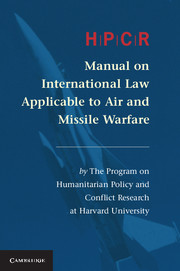Book contents
- Frontmatter
- Contents
- Foreword
- Introduction
- Black-Letter Rules of the HPCR Manual on International Law Applicable to Air and Missile Warfare
- Commentary to the HPCR Manual on International Law Applicable to Air and Missile Warfare
- Appendix I Group of Experts
- Appendix II Sessions of the Group of Experts
- Appendix III List of Informal Meetings with State Representatives
- Appendix IV Drafting Committee: Members & Meetings
- Appendix V Table of Treaties (Chronological)
- Appendix VI Table of Abbreviations
- Index
Foreword
Published online by Cambridge University Press: 05 July 2013
- Frontmatter
- Contents
- Foreword
- Introduction
- Black-Letter Rules of the HPCR Manual on International Law Applicable to Air and Missile Warfare
- Commentary to the HPCR Manual on International Law Applicable to Air and Missile Warfare
- Appendix I Group of Experts
- Appendix II Sessions of the Group of Experts
- Appendix III List of Informal Meetings with State Representatives
- Appendix IV Drafting Committee: Members & Meetings
- Appendix V Table of Treaties (Chronological)
- Appendix VI Table of Abbreviations
- Index
Summary
It is my pleasure and honor to present the HPCR Manual on International Law Applicable to Air and Missile Warfare and its Commentary. The HPCR Manual provides the most up-to-date restatement of existing international law applicable to air and missile warfare, as elaborated by an international Group of Experts. As an authoritative restatement, the HPCR Manual contributes to the practical understanding of this important international legal framework.
The HPCR Manual and its Commentary are the results of a six-year-long endeavor led by the Program on Humanitarian Policy and Conflict Research at Harvard University (HPCR), during which it convened an international Group of Experts to reflect on the existing rules of international law applicable to air and missile warfare. This Group of Experts, under the guidance of HPCR Senior Academic Advisor, Professor Dr. Yoram Dinstein, has conducted, since 2004, a methodical and comprehensive reflection on international legal rules applicable to air and missile warfare, drawing from various sources of international law. The Black-Letter Rules of the HPCR Manual were adopted by consensus by the Group of Experts in Bern, Switzerland, on 15 May 2009. The Commentary on the Black-Letter Rules was drafted by selected experts from the original group, under the supervision of Professor Dinstein and HPCR Project Coordinator, Bruno Demeyere. While the HPCR Manual restates current applicable law, the Commentary clarifies the prominent legal interpretations and indicates differing perspectives.
- Type
- Chapter
- Information
- Publisher: Cambridge University PressPrint publication year: 2013



